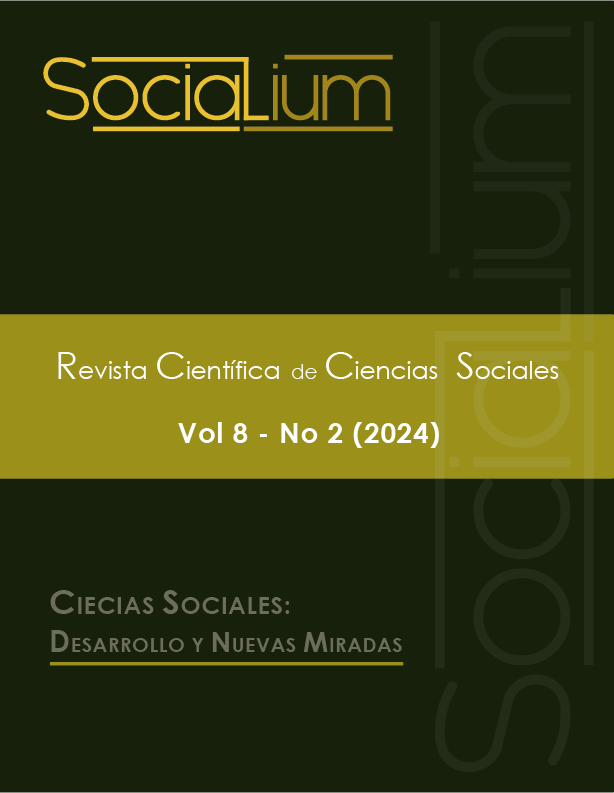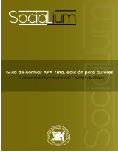Online love: the psychological processes and evolution of online and offline relationships in young adults in Mexico
DOI:
https://doi.org/10.26490/uncp.sl.2024.8.2.1984Keywords:
Online love, virtuality, intimacy, passion, commitmentAbstract
The purpose of this research was to analyze the characteristics, motivations and perceptions of people in online relationships, as well as the differences in the evolution of these compared to traditional offline relationships in young adults from different states of Mexico, users and non-users of online dating apps through mixed-type exploratory sequential research that combines qualitative and quantitative phases. In the virtual world, the psychological aspects of the love process such as passion, commitment, intimacy, motivation, and the evolution of relationships occur in a personal and symbolic imaginary in the absence of physical contact. The first gathered information from 545 people who are users and non-users of dating apps. The second phase was carried out throughout six online in-depth interviews to better understand findings in the first exploratory stage. Findings support more similarities than differences in the establishment and evolution of online and in-person relations. For example, there is a fear of lack of honesty and eventual commitment and in general all participants initially expect to consolidate eventually their relationship. Online dating is perceived as adventuresome, and it is motivated to increase the opportunities to meet someone outside the real social context. In conclusion, virtual tools can help to start a romantic relationship, however, that doesn´t guarantee a successful relationship. The findings don´t support the notion that love online is a psychologically different than offline relationships, rather this is seen as a first exploratory stage in a romantic relationship.
Downloads
References
Aguado, J. M. (2018). El mensaje es el medio: Las aplicaciones de mensajería como interfaz emergente en el ecosistema móvil. Revista de la Asociación Española de Investigación de la Comunicación, 5(10), 2-9. https://www.revistaeic.eu/index.php/raeic/article/view/175
Aladro, E., Valbuena, F. & Padilla, G. (2012). Redes sociales y jóvenes preuniversitarios españoles: los nuevos ejes de socialización y comunicación. Austral Comunicación, 1(1), 27-40. https://dialnet.unirioja.es/servlet/articulo?codigo=5652792
Álvarez, F. J. (2018). El amor en los tiempos modernos. Repositorio digital de la Universidad Nacional de Educación. http://repositorio.unae.edu.ec/handle/56000/488
Alvídrez, S., & Rojas-Solís, J. (2017). Los amantes en la época del Smartphone: Aspectos comunicativos y psicológicos relativos al inicio y mantenimiento de la relación romántica. Global Media Journal, 14(27), 1-18. https://gmjmexico.uanl.mx/index.php/GMJ_EI/article/view/290
Bianchi, D., Morelli, M., Baiocco, R., Cattelino, E., & Chirumbolo, A. (2021). Patterns of love and sexting in teen dating relationships: The moderating role of conflicts. New Directions for Child and Adolescent Development, (178), 133-155. https://pubmed.ncbi.nlm.nih.gov/34109733/
Castro, Á., & Barrada, J. R. (2020). Dating apps and their sociodemographic and psychosocial correlates: A systematic review. International journal of environmental research and public health, 17(18), 6500. https://pmc.ncbi.nlm.nih.gov/articles/PMC7557852/
Clemente (2020). Número de usuarios de redes sociales en todo el mundo estatista. Statia. https://www.statista.com/statistics/278414/number-of-worldwide-social-network-users/
Hernández, C., Alcoceba, J. A., & Cadilla, M. (2014). La percepción del riesgo en las redes sociales entre la juventud inmigrada en España. Revista de la Asociación Española de Investigación de la Comunicación, 1(1), 1-11. https://doi.org/10.24137/raeic.1.1.2
Illouz, E. (2017). Intimidades congeladas. Las emociones en el capitalismo. Katz
Linne, J. & Fernández, P. (2019). En búsqueda del match perfecto. Perfiles, experiencias y expectativas socioafectivas de jóvenes en torno a Tinder. Última década, 27(51), 96-122. http://dx.doi.org/10.4067/S0718-22362019000100096
Naezer, M., & van Oosterhout, L. (2021). Only sluts love sexting: Youth, sexual norms and non-consensual sharing of digital sexual images. Journal of Gender Studies 30(1), 79-90. https://doi.org/10.1080/09589236.2020.1799767
Statista (2021). Most popular social networks worldwide as of July 2021, ranked by number of active users (in millions.). Statista. https://www.statista.com/statistics/272014/global-social-networks-ranked-by-number-of-users/
Sternberg. (1986). Triangular theory of love. Psychological Review, 93(2), 119-135. https://doi.org/10.1037/0033-295X.93.2.119
Sumter, S. R., & Vandenbosch, L. (2019). Dating gone mobile: Demographic and personality-based correlates of using smartphone-based dating applications among emerging adults. New media & society, 21(3), 655-673. https://doi.org/10.1177/1461444818804773
Zelizer, V. A. (2009). Intimacy in economic organizations. Research in the Sociology of Work, 18, 23-55. https://doi.org/10.1108/s0277-2833(2009)0000018005
Downloads
Published
Issue
Section
License
Copyright (c) 2024 Aleyda Vizzuetth Herrera, Pedro Sánchez Escobedo

This work is licensed under a Creative Commons Attribution 4.0 International License.








.jpg)












